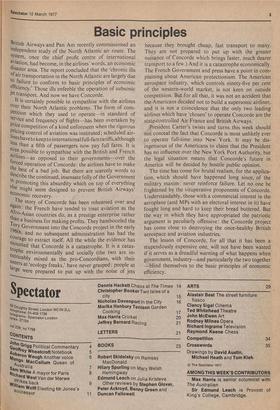Basic principles
British Airways and Pan Am recently commissioned an independent study of the North Atlantic air route. The system, once the chief profit centre of international aviation, had become, in the airlines' words, an economic disaster area. The report concluded that the 'chronic ills of air transportation in the North Atlantic are largely due to failure to conform to basic principles of economic efficiency, Those ills enfeeble the operation of subsonic Jet transport. And now we have Concorde. It is certainly possible to sympathise with the airlines over their North Atlantic problems. The form of competition which they used to operate—in standard of service and frequency of flights—has been overtaken by Price competition of a kind unforeseen when the rigorous Pricing control of aviation was instituted; scheduled airlines have to keep to international full-fare tariffs, although less than a fifth of passengers now pay full fares. It is ev. en possible to sympathise with the British and French nes—as opposed to their governments—over the °reed operation of Concorde: the airlines have to make the .best of a bad job. But there are scarcely words to ilescribe the continued, insensate folly of the Government in Promoting this absurdity which on top of everything else might seem designed to prevent British Airways' economic recovery. The story of Concorde has been rehearsed over and aAganal: the French have tended to treat aviation as the _fro-Asian countries do, as a prestige enterprise rather uan a business for making profits. They bamboozled the Government into the Concorde project in the early 960s, and no subsequent administration has had the Courage • to extract itself. All the while the evidence has _mounted that Concorde is a catastrophe. It is a catastroPhe environmentally and socially (the two are inextricably mixed as the pro-Concordians, with their ,sneers at 'ecology freaks,' have never grasped: people at larne were prepared to put up with the noise of jets because they brought cheap, fast transport to many. They are not prepared to put up with the greater nuisance of Concorde which brings faster, much dearer transport to a few.) And it is a catastrophe economically. The French Government and press have a point in complaining about American protectionism. The American aerospace industry, which controls ninety-five per cent of the western-world market, is not keen on outside competition. But for all that, it was not an accident that the Americans decided not to build a supersonic airliner, and it is not a coincidence that the only two leading airlines which have 'chosen' to operate Concorde are the state-controlled Air France and British Airways.
President Carter's twists and turns this week should not conceal the fact that Concorde is most unlikely ever to operate full-time into New York. It may be disingenuous of the Americans to claim that the President has no influence over the New York Port Authority, but the legal situation means that Concorde's future in America will be decided by hostile public opinion.
The time has come for brutal realism, for the application, which should have happened long since, of the military maxim: never reinforce failure. Let no one be frightened by the vituperative proponents of Concorde. Understandably, those with a commercial interest in the aeroplane (and MPs with an electoral interest in it) have fought long and hard to keep their bread buttered. But the way in which they have appropriated the patriotic argument is peculiarly offensive: the Concorde project has come close to destroying the once-healthy British aerospace and aviation industries.
The lesson of Concorde, for all that it has been a stupendously expensive one, will not have been wasted if it serves as a dreadful warning of what happens when government, industry—and particularly the two together --blind themselves to the basic principles of economic efficiency.






































 Previous page
Previous page